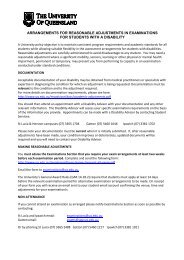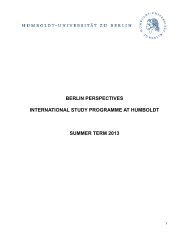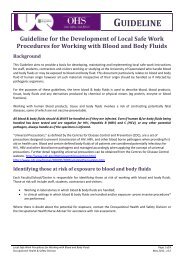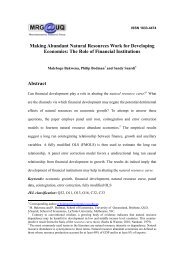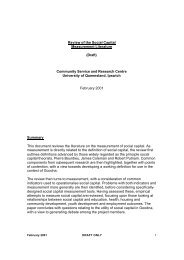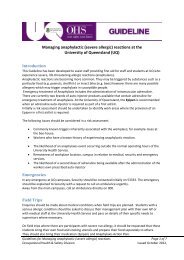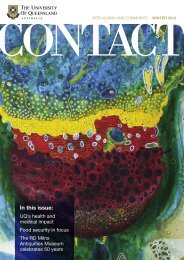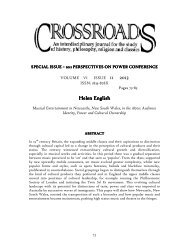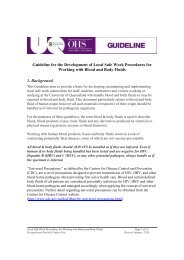Thinking, Willing and Judging - University of Queensland
Thinking, Willing and Judging - University of Queensland
Thinking, Willing and Judging - University of Queensland
Create successful ePaper yourself
Turn your PDF publications into a flip-book with our unique Google optimized e-Paper software.
THINKING, WILLING AND JUDGING‘To dismantle metaphysics requires me to take it in h<strong>and</strong>. Inevitably some sticks to my fingers.’ iBEING MINDFUL OF THE MINDIn this paper we shall enter into conversation with Max Deutscher’s most recent book, Judgment After Arendt.Deutscher’s book is an extended engagement with Hannah Arendt’s trilogy, The Life <strong>of</strong> the Mind, <strong>and</strong> its bookson thinking, willing <strong>and</strong> judging. ii While Deutscher’s book is based around a close <strong>and</strong>, at times, page by pagereading <strong>of</strong> Arendt’s book, his book is not, in the usual sense, a piece <strong>of</strong> Arendt scholarship. Deutscher only veryoccasionally engages, in any depth, with Arendt’s other texts or with the extensive secondary literature onArendt. iii This approach allows Deutscher to avoid getting mired in what have become the clichés <strong>of</strong> thatliterature, such as the alleged contradiction between Arendt’s two accounts <strong>of</strong> judgment, iv recast The Life <strong>of</strong> theMind as a work primarily in phenomenology rather than in political theory (as it is <strong>of</strong>ten read), <strong>and</strong> broaden thescope <strong>of</strong> his own project by extending the range <strong>of</strong> interlocutors who are brought into dialogue with Arendt’swork. vWhile Deutscher’s ‘ec-centric’ style <strong>of</strong> writing (‘[t]he hyphen disturbs the slur <strong>and</strong> reminds us <strong>of</strong> theinflexion’) vi is very different to Arendt’s, he nonetheless shares with her a similar method, a ‘historicallyinformed’ ‘post-metaphysics’ ‘influenced by phenomenology,’ vii a method that is at once ‘historical, fictional,poetic <strong>and</strong> analytical.’ viii This method, which is at home in our postmodern world ix <strong>and</strong> which draws freely <strong>and</strong>expertly upon both analytic <strong>and</strong> continental philosophical traditions, employs phenomenology to deconstructmetaphysics. Deutscher employs this method in Judgment After Arendt to investigate the life <strong>of</strong> the mind.In so doing Deutscher, following Arendt, examines the natural impulse we have to think about the mind indualistic <strong>and</strong> metaphysical terms. This impulse is not rejected as a sloppy inference. x Instead, thephenomenology <strong>of</strong> thinking that underwrites our impulse toward dualism is vindicated. When we think it reallyis as if we are no-where <strong>and</strong> no-when, as if we are lost in a world <strong>of</strong> thought, a world bound by laws <strong>of</strong> reasonrather than laws <strong>of</strong> causality. This is no mere fallacy or simple illusion, a ‘mirage that vanishes as weapproach.’ xi Someone who is thinking really is ‘somewhere else’; we talk to them, but they are utterly obliviousto what we say. They are lost in thought. ‘Hello!’ we cry, to call them back from wherever they have gone. xiiBut while Deutscher accepts that the experience or phenomenology <strong>of</strong> thinking, willing, <strong>and</strong> judgingunderwrites ‘impulses toward dualism,’ he rejects the ontological conclusions that the dualist draws. xiii Talk <strong>of</strong>being no-where <strong>and</strong> no-when when we think, or <strong>of</strong> an immaterial world <strong>of</strong> thought objects, is metaphorical talk.It is metaphorical talk because we cross directly over from one category to another by using terms at home insensation <strong>and</strong> observation, <strong>and</strong> apply these directly to another category, that <strong>of</strong> the mind. We speak <strong>of</strong> thinking,nous, as the mind’s eye. But we do not see things (invisible thought-things) with the mind like we see thingswith the eye. Rather it is the ‘relation between the eye <strong>and</strong> the object we see that can resemble the relationbetween nous <strong>and</strong> the object we think.’ xiv The brain is like the eye, but the mind, as the power <strong>of</strong> thinking,willing <strong>and</strong> judging that our brains make us capable <strong>of</strong>, is like the power <strong>of</strong> seeing that our eyes make us capable<strong>of</strong>. xv The mistake <strong>of</strong> dualism is to take our experience <strong>of</strong> the life <strong>of</strong> the mind, <strong>and</strong> the metaphorical language weuse to describe it, <strong>and</strong> reify those metaphors into hard ontological fact.In this way Deutscher reads Arendt, along with Gilbert Ryle (who was one <strong>of</strong> Deutscher’s Oxford teachers), xvias engaged in the project <strong>of</strong> underst<strong>and</strong>ing the mind in a way that avoids both dualism <strong>and</strong> reductivematerialism. This approach rejects the dualist’s claim that there are two worlds or two types <strong>of</strong> substance, onematerial <strong>and</strong> one immaterial. There is not a mind substance <strong>and</strong> a body substance, a Cartesian ghost in themachine to employ Ryle’s evocative phrase, xvii but rather a body that can think, will <strong>and</strong> judge; a ‘thinking,willing <strong>and</strong> judging body.’ xviii But this approach does not fall into reductive materialism. While, <strong>of</strong> course, the‘mind is the brain’ <strong>and</strong> ‘thinking is a brain process,’ only the dualist denies this, this identification doesn’t endthe story. xix This is because poking around in grey matter will tell us very little, by itself, about the life <strong>of</strong> themind, about thinking, willing <strong>and</strong> judging. As such, ‘it remains a conceptual <strong>and</strong> phenomenological business todescribe what brain processes make us capable <strong>of</strong>.’ xxWe are now in a position, having very briefly explored Deutscher’s general approach to the life <strong>of</strong> the mind, tocritically differ with the details <strong>of</strong> his Arendtian accounts <strong>of</strong> thinking, willing <strong>and</strong> judging. Such differing isessential to thinking. Indeed, plurality, differing from one another, is defining <strong>of</strong> the human condition as Arendtunderst<strong>and</strong>s it. But we can differ without parting company or, rather, we only keep each other (<strong>and</strong> ourselves)company by being different, by differing. In his generous reading <strong>of</strong> Arendt Deutscher writes: ‘A ‘flat’contradiction is stationary, the stultification <strong>of</strong> thought. In contrast, to be contradicted within thinking’s54


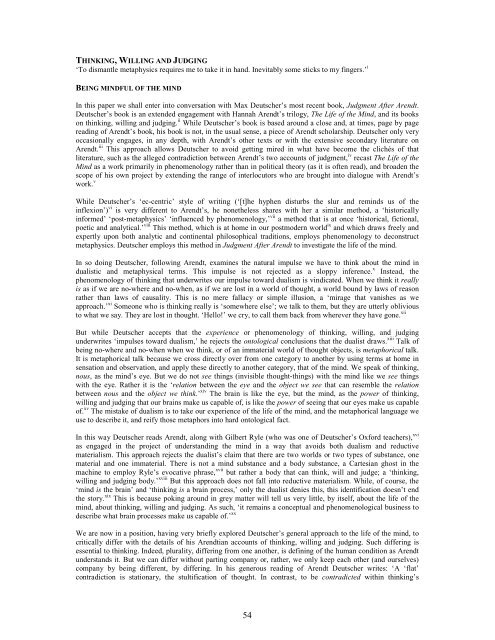
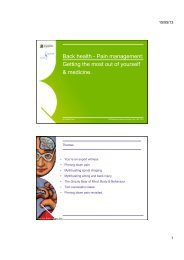
![Recycling [ PDF, 62KB ] - University of Queensland](https://img.yumpu.com/51805185/1/184x260/recycling-pdf-62kb-university-of-queensland.jpg?quality=85)
